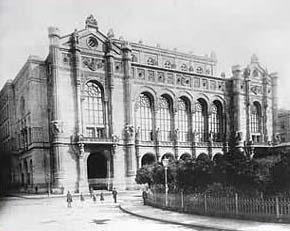Mahler's Symphonic Debut
Premiere

Mahler premiered his first symphony in the Vigadó Concert Hall, Budapest.
Mahler conducted the premiere of his first symphony with the Budapest Philharmonic Orchestra in the Vigadó Concert Hall on Wednesday 20th November 1889 eighteen months after the works completion. The concert program described the work as Symphoniai költemény két részben ("A Symphonic Poem in Two Sections").
By this time, Mahler had left his post as conductor at the Stadttheatre in Leipzig, taking up the position of Artistic Director of the Royal Hungarian Opera in Autumn 1888.
Premieres Negative Reception

The premiere was a debacle. Mahler had presented the audience with a programmatic symphonic poem, yet no explanatory program notes or descriptive titles were provided to assist the listener's interpretation of what the music was portraying. This caused much confusion and annoyance among the audience, which were particularly bewildered by the extreme and dramatic change of mood established by the funeral march.
In a review of the premiere for the Pester Lloyd newspaper, August Beer wrote:
"The reception of the Symphony was as divergent as the two halves of the work. Our concert audience, which was back today in full number, listened with alert interest to the first section, and Mahler, who also conducted, received warm applause after every movement. After the Death March the mood changed, and after the Finale there was slight but nevertheless audible opposition."
Mahler’s friend Fritz Löhr reported that "a considerable part of the audience, in its usual heartless way, had no understanding of anything formally new, particularly the dynamic vehemence of the tragic expression that was raging here; they were uncomfortably startled out of their thoughtless habit."
In a letter to Natalie Bauer-Lechner, Mahler wrote: "In Pest, where I performed it for the first time, my friends bashfully avoided me afterward; nobody dared talk to me about the performance and my work, and I went around like a sick person or an outcast."
Hamburg Revised Edition, 2nd Performance and reception
Following the symphony’s failure at the Budapest premiere, the work was left untouched for three years. Mahler began making revisions to the symphony in Hamburg between January and August 1893. The autographed Hamburg version is stored in the Osborn Collection at the Yale University Library. Inside it, the following revision dates are written:
"Blumine" movement - 16 August 1893; Scherzo - 27 January 1893; Finale - 19 January 1893. Although a direct comparison between the Budapest and Hamburg versions is not possible, since the whereabouts of the Budapest autograph manuscript is not known, it is likely that the primary revisions concerned the rebalancing of the instrumentation. Mahler wrote in a letter to Richard Strauss on 15th May 1984: "As a whole, everything has become more slender and transparent". He also addressed the major criticism from the premiere performance, regarding the lack of program notes provided to the audience. He added detailed descriptive movement titles along with a new title for the work: "Titan," a Tone Poem in Symphonic Form.
This version of the symphony was conducted by Mahler in Hamburg on Friday 27th October 1893, along with some of his lieder (songs) compositions, performed by Kammersänger Paul Bulss and Clementine Schuch-Prosska. The symphony proved an overall success, receiving largely positive reviews from the critics.

Third performance in Weimar and divided reception
Richard Strauss, who was conductor at the Saxon Court in Weimar, organised a music festival which including the work, conducted again by Mahler, taking place in Weimar on 3rd June 1894. Mahler made further changes to the program notes. The performance received a mixed reaction as evidenced in a letter from Mahler to his friend Arnold Berliner: "My symphony was received with furious opposition by some and with wholehearted approval by others. The opinions clashed in an amusing way, in the streets and in the salons!"
Fourth performance in Berlin, 'Absolute Music'
For the fourth performance, along with the removal of the second ‘Blumine’ movement, Mahler discarded all programmatic aspects of the work, instead opting to present the work as ‘absolute music’. He settled on the simple title: ‘Symphony in D Major’, also removing the extensive movement titles. Mahler conducted this fourth performance on 16th March 1896 in Berlin. The composer and music critic Ernst Otto Nodnagel, approved of these major revisions which addressed previous criticisms he had raised in his review of the 2nd performance (published in the Berliner Tageblatt and Magazin für Litteratur), regarding the confusing programme notes and the "Trivial" ‘Blumine’ movement. He wrote that the latest version of the work received "lively approval, even from part of the hostile press."
However, the symphony still did not achieve the response Mahler felt his work deserved.
Bauer-Lechner who was in attendence of the concert described the unremarkable audience reception as "rather warm and affirmative" adding that Mahler detected "the cold effect on the listener" repeating "most sadly": "No, they have not understood it!".